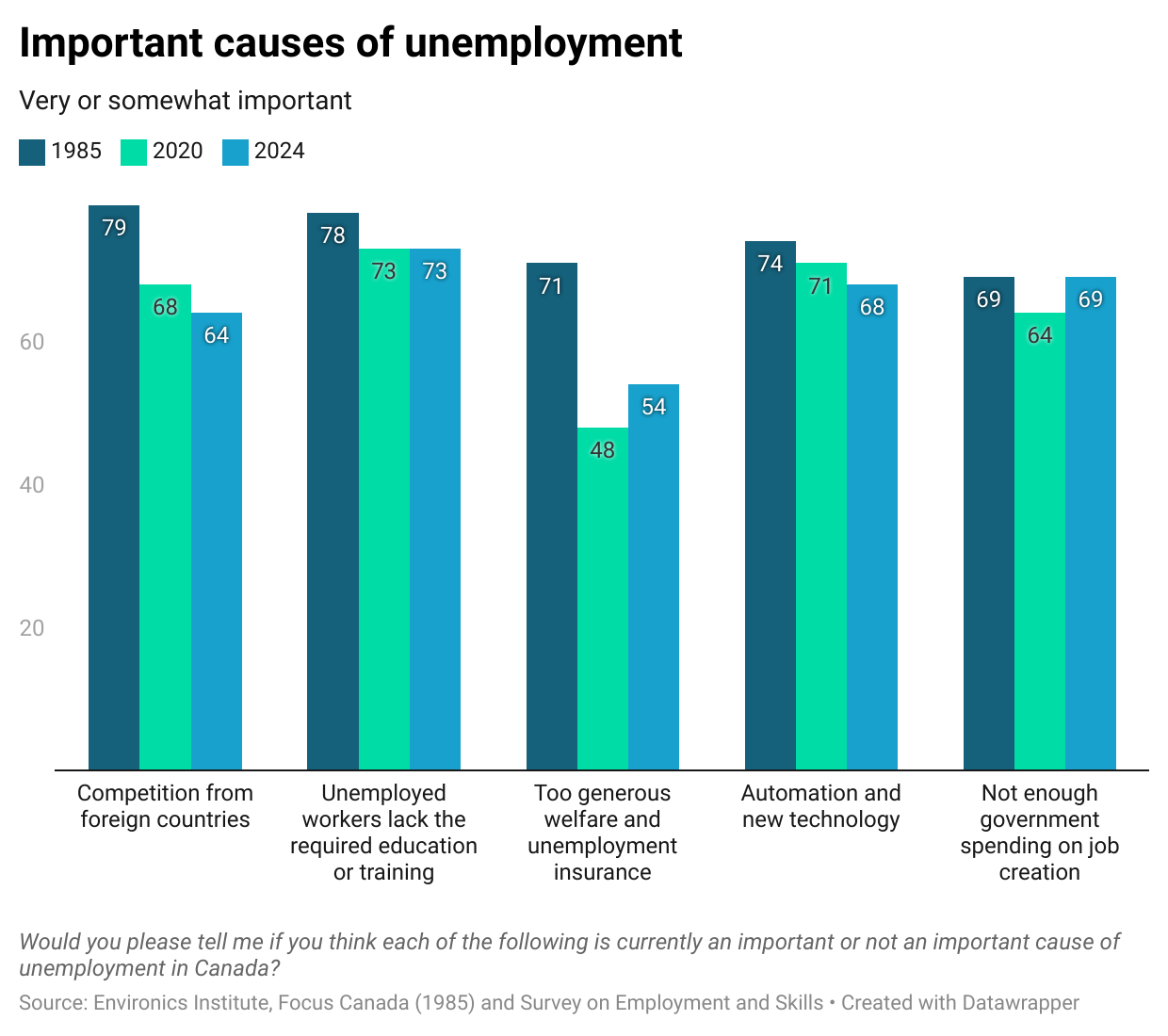When did we first start worrying about the robots?
Opinions on the causes of unemployment, then and now
If we want to see how opinions have changed over time, it’s ideal to assemble results from a survey question asked repeatedly, in the same format, over a long period of time. Yet, often we find ourselves a long way from the ideal. Sometimes we have to make the best of what we’ve got.
Here’s one example. In 1985, Environics asked Canadians about the causes of unemployment. In a perfect world, someone would’ve kept asking that same question every two years or so, to track the ups and downs in opinions. In the real world, it wasn’t asked again1 until the Survey on Employment and Skills was launched in March 2020. And we re-asked it again in the summer of 2024.
Here’s what we found.
I’m going to offer just a few short observations.
First, in some cases, what’s notable is the absence of change. For instance, roughly the same proportions of Canadians in 1985, and then again almost 40 years later, in 2024, see the lack the education or training, or the absence of government spending on job creation, as important causes of unemployment.
Second, some things have changed. Canadians seem to be a little less worried about foreign competition today than they were at the dawn of the era of free trade. More striking is the drop in the proportion thinking that “too generous welfare and unemployment insurance” is an important cause of unemployment. While it appears that some of us still think that our social safety net disincentivizes work, the number who do has shrunk.2 Since the survey question wasn’t asked at regular intervals in the 1990s and 2000s, we don’t know exactly when opinions shifted, but it’s reasonable to guess that it followed the 1995 federal budget.
Finally, what really caught my eye is the extent of concern about technological change. The proportion that sees “automation and new technology” as an important cause of unemployment in Canada is almost the same (and actually a little lower) in 2024 as it was in 1985.
Why hasn’t the introduction of desktop and laptop computers, the Internet, email, smartphones, robotics, artificial intelligence and a whole host of other technologies sparked an increase in anxiety about the future of work? Because that anxiety was already there for a majority of Canadians 40 years ago, when I was still using a typewriter.
We’re been talking about whether the robots are coming for our jobs for a long time. The survey results suggest that a certain concern about the implications of technological change (for employment, at least, if not for other things) seems to be baked into the public’s mindset. It’s not likely to spike up in reaction to whatever is on the latest cover of Wired magazine.
That said, with the Survey on Employment and Skills, we can now check up on these things – to see what is and isn’t changing – on a more regular basis.
The data in this post are from the Survey on Employment and Skills. This survey is conducted by the Environics Institute for Survey Research, in partnership with the Diversity Institute at Toronto Metropolitan University and the Future Skills Centre. The 7th wave of the study consists of a survey of 5,855 Canadians age 18 and over, conducted between May 30 and July 4, 2024, in all provinces and territories. It was conducted both online (in the provinces) and by telephone (in the territories). More information about the survey is available on the Environics Institute website. The author is solely responsible for any errors of presentation or interpretation.
The Survey on Employment and Skills is funded primarily by the Government of Canada’s Future Skills Centre / Le sondage sur l’emploi et les compétences est financé principalement par le Centre des Compétences futures du gouvernement du Canada.
What is the Environics Institute for Survey Research? Find out by clicking here.
Follow us on other platforms:
Twitter: @Environics_Inst or @parkinac
Instagram and Threads: environics.institute
As far as I’m aware.
To read about why this idea is misplaced, check out: Is unemployment a public health issue?




